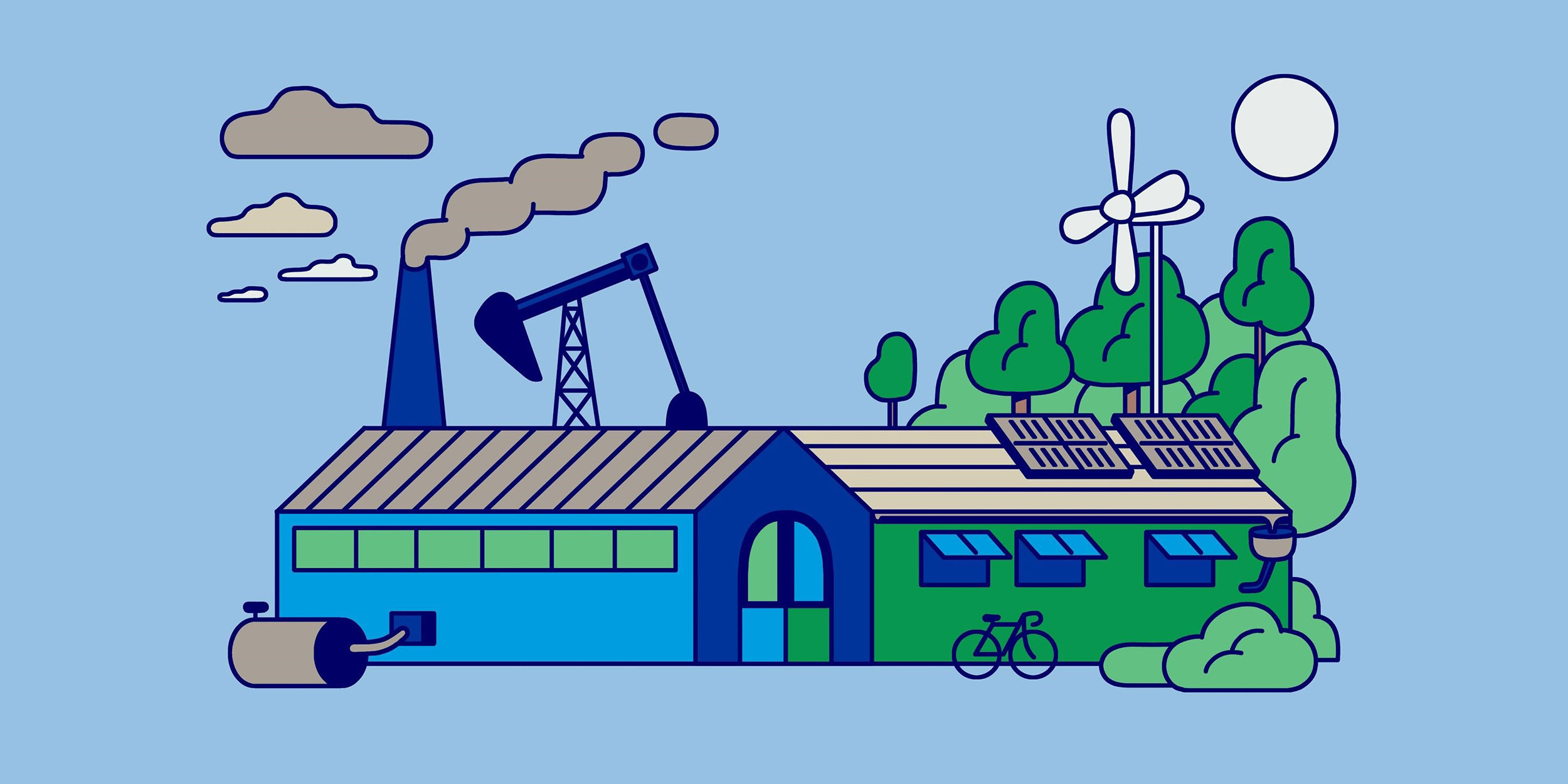Could Fixing The Climate Emergency Cost You Your Job?
SustainabilityArticleApril 2, 2020
Zurich is working together with VICE to look at how transitioning to a low carbon economy could affect the world of work
The climate emergency isn’t just bad for the planet, it could also be bad for your career. From extreme weather events destroying businesses and disrupting supply chains, all the way through to governments banning companies from doing certain things, climate change is going to change the world of work a lot more than you might think. How exactly that will happen is hard to predict, but we know that if we’re going to stop the climate emergency then we need to seriously reduce the amount of carbon being pumped into the atmosphere.
Climate change is already having a big impact on the world of work, the International Labour Organisation (ILO) estimates that from 2000 to 2015, around 23 million working-life years, which is the number of years someone can spend working, were lost every single year because of environmentally related hazards caused by or exacerbated by human activity. “There is a huge human toll,” Moustapha Kamal Gueye, coordinator of the green jobs programme at the ILO tells VICE. This has mainly been in Africa and Asia, but as the impacts of climate change increase it will probably get much worse in Europe and the need for a transition to a low carbon economy is only going to grow.

Getting emissions down to a level where they stop damaging the planet is going to mean some industries we currently have, like those which mainly use fossil fuels, are going to have to either shut down or change what they’re doing completely. “Some jobs are going to be lost,” says Gueye. “We estimate about 6 million jobs in the regions that depend a lot on fossil fuels, this would essentially be the Middle East and Africa. That's where we see most of the job displacement as a consequence of this transition.”
But it isn’t all bad news according to Gueye, as fixing the climate emergency could actually create a lot more jobs than it destroys, as long as governments and business are prepared to invest in new technologies: “[If] countries go ahead and implement the Paris Agreement on climate change with measures that focus specifically on scaling up renewable energy, energy efficiency improvements and a larger deployment of electric vehicles, we find that some 24 million jobs could be created around the world.”
Some workers will find it easier than others to deal with the way the transition impacts the economy. Gueye says: “It's important for workers to build the new skills that they will need to navigate the labour market, moving from occupations that will be declining towards occupations that may emerge. The typical example is if fossil fuel extraction is scaled down, can we imagine situations where engineers that work on petroleum platforms offshore being employed in offshore wind energy production?”
But for workers who don’t have easily transferable skills, who are currently working in industries which end up going into decline as a result of the transition, the consequences of the transition are much the same as the consequences of globalization. Heavy industries such as iron, steel and coal have been moving jobs to cheaper economies over the past 30 years and this has had a big impact in the communities where the industries were based.
“Many people lost their jobs in parts of the world often referred to as the ‘rust belt’ areas of developed economies like in Europe and North America,”says John Scott, head of sustainability risk for Zurich Insurance Group.
“The consequence of that has been truly dramatic, whole communities where workers have been out of work not just for one generation, but two or three generations. When that happens those communities have often become impoverished, not just economically, but societally too affecting the life chances and economic opportunities of people for many years. This is the risk facing countries and regions with the transition to low-carbon economies.”
Scott warns that society will have to support workers in carbon intensive sectors as those parts of the economy go into decline, or we could see social unrest break out like the Yellow Vest protests in France or see societies reject the transition. “It's just such a big impact on individuals, and there's a societal cost. If these things happen in an abrupt manner there’s likely to be a political and societal backlash”, Scott adds.
Shifting to a low carbon economy doesn’t even need to be bad for workers, we could all just work less says Dr Matthew Cole from the Leeds University Business School. “We could immediately shorten the work week to 30 hours and give everyone more leisure time. Keynes famously predicted that by the year 2030 we could all be working fifteen-hour work weeks if productivity trends at the time had continued. A four-day week would put us closer to Keynes’ vision while also lowering commuter traffic which is one of the worst polluters.”
But shortening the working week might not be a great idea according to Scott, who says: “The only challenge with this thinking is that unless there is an increase in productivity (i.e. output per capita) we don’t see the economic or societal benefits. Unfortunately this is the situation we see at the moment, with many people working in low paid insecure jobs, or on zero-hours contracts, which is neither good for workers nor for the economy.”
What the future holds largely depends on the choices we make now. If we don’t do anything then climate change will continue to ravage the planet. If we start transitioning to a low carbon economy now and plan it out carefully it could create millions of green jobs. But trying to rush things through in the future may end up having an enormous human cost. Whatever we decide to do, we need to act fast, before it’s too late.
To learn more about the global risks impacting our future, download the Global Risks Report 2020 or read more on the Zurich Knowledge Hub.
This publication has been prepared by Zurich Insurance Group Ltd and Vice UK Limited and the opinions expressed in it are those of Zurich Insurance Group Ltd and Vice UK Limited as of the date of writing and are subject to change without notice. This publication has been produced solely for informational purposes. The analysis contained and opinions expressed herein are based on numerous assumptions. Different assumptions could result in materially different conclusions. All information contained in this publication has been compiled and obtained from sources believed to be reliable and credible but no representation or warranty, express or implied, is made by Zurich Insurance Group Ltd or any of its subsidiaries (the ‘Zurich Group’) or Vice UK Limited or any of its subsidiaries (the ‘Vice Group’) as to their accuracy or completeness. This publication is not intended to be legal, underwriting, financial, investment or any other type of professional advice. Persons requiring advice should consult an independent adviser. The Zurich Group and the Vice Group disclaim any and all liability whatsoever resulting from the use of or reliance upon this publication. Certain statements in this publication are forward-looking statements, including, but not limited to, statements that are predictions of or indicate future events, trends, plans, developments or objectives. Undue reliance should not be placed on such statements because, by their nature, they are subject to known and unknown risks and uncertainties and can be affected by other factors that could cause actual results, developments and plans and objectives to differ materially from those expressed or implied in the forward looking statements. The subject matter of this publication is also not tied to any specific insurance product nor will it ensure coverage under any insurance policy. This publication may not be reproduced either in whole, or in part, without prior written permission of Zurich Insurance Group Ltd, Mythenquai 2, 8002 Zurich, Switzerland and Vice UK Limited 2-4 New North Place, London, UK EC2A 4JA. Zurich Insurance Group Ltd and Vice UK Limited expressly prohibit the distribution of this publication by or to third parties for any reason. Neither the Zurich Group nor the Vice Group accept liability for any loss arising from the use or distribution of this presentation. This publication is for distribution only under such circumstances as may be permitted by applicable law and regulations. This publication does not constitute an offer or an invitation for the sale or purchase of securities in any jurisdiction.


